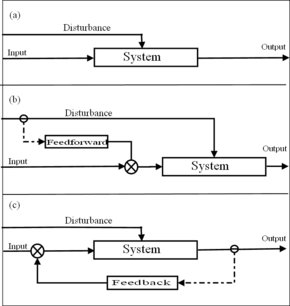
- Open-loop control
- Feed-forward
- Feedback (closed loop) control
A feed forward (sometimes written feedforward) is an element or pathway within a control system that passes a controlling signal from a source in its external environment to a load elsewhere in its external environment. This is often a command signal from an external operator.
In control engineering, a feedforward control system is a control system that uses sensors to detect disturbances affecting the system and then applies an additional input to minimize the effect of the disturbance. This requires a mathematical model of the system so that the effect of disturbances can be properly predicted.[2]
A control system which has only feed-forward behavior responds to its control signal in a pre-defined way without responding to the way the system reacts; it is in contrast with a system that also has feedback, which adjusts the input to take account of how it affects the system, and how the system itself may vary unpredictably.
In a feed-forward system, the control variable adjustment is not error-based. Instead it is based on knowledge about the process in the form of a mathematical model of the process and knowledge about, or measurements of, the process disturbances.[3]
Some prerequisites are needed for control scheme to be reliable by pure feed-forward without feedback: the external command or controlling signal must be available, and the effect of the output of the system on the load should be known (that usually means that the load must be predictably unchanging with time). Sometimes pure feed-forward control without feedback is called 'ballistic', because once a control signal has been sent, it cannot be further adjusted; any corrective adjustment must be by way of a new control signal. In contrast, 'cruise control' adjusts the output in response to the load that it encounters, by a feedback mechanism.
These systems could relate to control theory, physiology, or computing.
- ^ Hopgood, Adrian A. (2001). "14". Intelligent systems for engineers and scientists (2nd ed.). Boca Raton, Fla: CRC Press. p. 378. ISBN 978-0-8493-0456-9. OCLC 44573380.
- ^ Escudier, Marcel; Atkins, Tony (2019). "A Dictionary of Mechanical Engineering". doi:10.1093/acref/9780198832102.001.0001. ISBN 978-0-19-883210-2.
{{cite journal}}: Cite journal requires|journal=(help) - ^ Haugen, F. (2009). Basic Dynamics and Control. ISBN 978-82-91748-13-9.